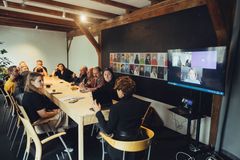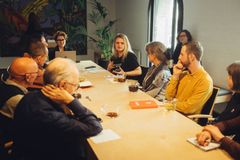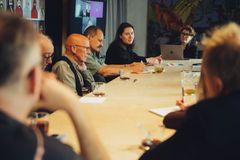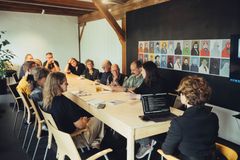Language as a Weapon: Confronting the Kremlin’s Rhetoric of Hate and Incitement to Genocide
As Russia wages war on the battlefield, it also wages a mental war of hate and disinformation. At Ukraine House in Denmark, a panel of leading experts came together to reveal how Kremlin-sponsored hate speech and disinformation are not only deepening Russia’s war against Ukraine—but may themselves constitute international crimes.The panel examined how language becomes weaponized: how it dehumanizes, distorts, and incites. This is not just about information manipulation—it is about cultivating moral indifference to atrocity.
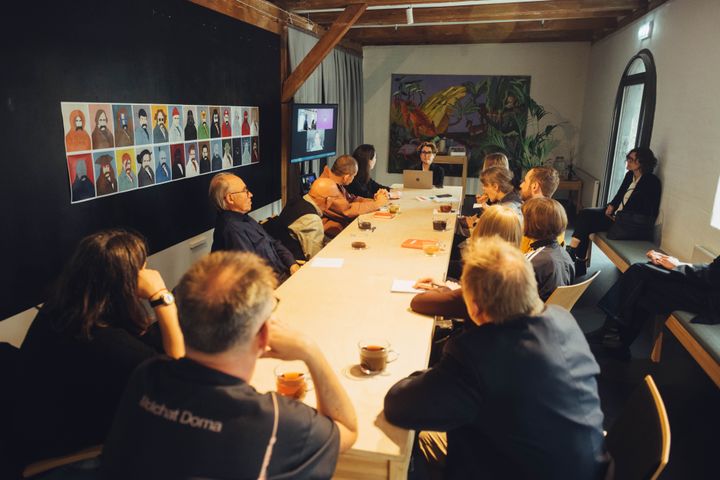
Propaganda as Doctrine, Not Noise
Iryna Baran El Ghali, Advocacy Manager of the Crimean Human Rights Group, opened the event with a sobering analysis ofRussian state-affiliated media monitored since 2014. Her findings revealed a deliberate transformation of messaging: from crude disinformation to calculated incitement to genocide. The state-controlled media system was not simply echoing war, but preparing society to accept and even embrace mass violence.
“Russian media are following a strategy on deforming the Ukrainian nation [but] they are not even using the word “Ukrainian”. They are replacing it with Nazis, Banderas, satanists. These particular kinds of narratives are quite spread among Russia and they are inviting people of different professions, military, religious opinion leaders, who are commenting that actually Ukrainians are are working against Christianity and especially the Orthodox. Those narratives often are then framed with advice to perform the patriotic duty and kill Ukrainians.”
By invoking religious justification and national pride, this propaganda seeks to make violence appear morally necessary.
This linguistic warfare is not confined to isolated programs—it is woven into daily broadcasts across major channels. Her remarks underscored that this shift is not accidental or fringe; it is a deliberate campaign to soften public perception of violence and prime a nation for atrocity.
Telegram and the Rise of the Unmoderated Platforms as Cognitive Warfare
A critical theme throughout the discussion was the role of digital platforms—particularly Telegram—in rapidly spreading hate speech and genocidal content. While Western legal systems struggle with the regulation of tech giants, Russia has weaponized platforms that fall outside most content moderation frameworks. According to Iryna Baran El Ghali, Telegram has become an unregulated echo chamber where televised hate becomes viral messaging.
She cited a chilling example of Dmitry Puchkov, a Russian writer and TV presenter, who casually discussed the extermination of Ukrainians during a broadcast—content that was then uploaded to YouTube and viewed by millions.
“I think that all these Nazi scum should be ruthlessly massacred. It is useless to re-educate them. The fact that they are buried there in big numbers is good for them and for us too.”
Baran El Ghali emphasized that this is not fringe extremism—it is part of Russia’s national media apparatus. These kinds of statements are widely circulated, often translated into memes and shorts, stripped of accountability, and disguised as opinion or entertainment.
The Law is Failing to Catch Up
International legal expert Anna Mykytenko addressed what may be the most disturbing implication of this media campaign: it remains largely unpunished. While the Crimean Human Rights Group’s findings included numerous examples of hate speech and indirect incitement to genocide, prosecuting these crimes under current international law remains extraordinarily difficult. While incitement to genocide is criminalized under the Rome Statute, current definitions require explicit and direct calls to kill—something modern propagandists avoid with calculated ambiguity:
“Incitement to genocide [...] is a crime under the International Criminal Court statute. [...] In all European countries, incitement to genocide is usually punishable imprisonment between 10 to 10 years. Incitement to genocide, however, requires direct and concrete calls to kill someone or to take children from one ethnic group or protected group to another. And direct and concrete [speech] is usually a problem because when you hear something like that on TV, it's not direct.”
The issue is that the law is outdated and is not developed in line with what's happening in practice. This legal gap means that those propagandists of dehumanization operate freely. Even when speech verges on direct incitement, the inability to link it to specific violent acts often prevents prosecution. The law, in its current form, is not built for weaponized ambiguity. The result? Broadcasters promoting violence face little to no accountability, even when their speech clearly fosters hatred.
The Normalization of Extremism, Erosion of Moral Boundaries
Raimonda Miglinaite Fritz of the European External Action Service (EEAS), provided a broader geopolitical lens into the discussion through her work on the EUvsDisinfo platform, which has catalogued thousands of cases where Russian propaganda sought to destabilize democratic societies. Yet, the volume and virulence of hate speech in the context of Ukraine has created a new frontier. Fritz detailed patterns that mirror genocidal rhetoric from past atrocities: the dehumanization of Ukrainians, historical revisionism, the demonization of leaders like President Zelensky, and narratives framing Ukrainian children and civilians as legitimate military targets.
Despite her team’s growing database, Fritz admitted that legal and policy tools have not evolved fast enough to confront these new forms of manipulation. Telegram, in particular, avoids EU regulation by staying below key user thresholds—allowing it to remain a powerful tool of incitement without oversight.
Perhaps the most haunting theme of the discussion was the normalization of extreme violence through language. Over time, euphemism and metaphor transform into belief. Those beliefs, when unchallenged, can become action. Fritz warned that Russian media is creating an environment where violence against Ukrainians is framed as a moral duty.
“First, we observed how in the Russian media space there was a normalization of extremism. Hate speech itself became normalized. [...] At the beginning of the invasion, there was an attempt to construct the narrative that we [Russians and Ukrainians] are one people, except you have a Nazi Kyiv regime. But as Russia started failing in its military goals, the scope of Nazis expanded and suddenly everything Ukrainian was Nazi. This becomes normalized, and when this type of language becomes normalized for domestic audiences, then the public is desensitized. Extreme violence and crime are acceptable as a way to reach national interest.”
She underscored that this “cognitive warfare” is not confined within Russia. Telegram, among other platforms, spreads these narratives to global audiences, further undermining democratic resilience and making war crimes appear acceptable.
Key Takeaways
The panel concluded not just with analysis to take as urgent lessons from the discussion:
-
Incitement to genocide today is strategic and indirect, often using metaphor, implication, and repetition rather than explicit calls to violence.
-
Telegram and similar platforms are accelerating the spread of hate speech without regulation or transparency, allowing state-backed media to bypass EU and international oversight.
-
International law must evolve to prosecute psychological warfare and rhetorical incitement in the digital age.
-
Monitoring and reporting are essential, but must be paired with enforcement tools and platform accountability mechanisms.
-
Civil society, journalists, and lawmakers must work together to develop new legal definitions, update international conventions, and recognize hate speech as a precursor to atrocity.
Thank you to the Crimean Human Rights Group for co-hosting, and to everyone who joined us for this critical conversation. You can read the newly published report, “Information War Crimes: Incitement of genocide and war of aggression in the Russian media space” by the Crimean Human Rights Group here.
Keywords
Images
About Ukraine House
The Ukraine House in Denmark is a civil society organisation of Ukrainian cultural diplomacy based in Copenhagen. Its mission is to form an enduring positive influence of Ukraine on Ukrainian-Danish cooperation, security, and lasting peace in Europe.
Subscribe to releases from Ukraine House in Denmark
Subscribe to all the latest releases from Ukraine House in Denmark by registering your e-mail address below. You can unsubscribe at any time.
Latest releases from Ukraine House in Denmark
Udstillingen »My Body Is a Battlefield« udsat for hærværk i København23.12.2025 12:39:22 CET | Nyhed
København, 23. december 2025 – Ukraine House in Denmark (UHD) og Spilne Art fordømmer på det kraftigste hærværket mod skulpturerne fra udstillingen »My Body Is a Battlefield. Copenhagen« [Min krop er en slagmark, København] af den ukrainske kunstner Mariia Kulykivska. Udstillingen, der var organiseret af Spilne Art i samarbejde med Ukraine House i Danmark, blev udsat for hærværk i fuldt dagslys den 22. december 2025 i nærheden af UHD's lokaler.
Exhibition “My Body Is a Battlefield.” vandalised in Copenhagen23.12.2025 11:27:49 CET | Nyhed
Copenhagen, 23 December 2025 — Ukraine House in Denmark (UHD) and Spilne Art strongly condemn the vandalism of outdoor sculptures from the exhibition “My Body Is a Battlefield. Copenhagen” by Ukrainian artist Mariia Kulykivska. The exhibition, organised by Spilne Art in cooperation with Ukraine House in Denmark, was vandalised in broad daylight on 22 December 2025 near the premises of UHD.
"An open world is not a naïve world." — Nataliia Popovych at the Open World Conference 202517.12.2025 08:00:00 CET | Pressemeddelelse
In her speech during the Open World Conference 2025, organized by the University of Copenhagen to discuss the contemporary relevance of Niels Bohr's historic letter to the United Nations about the principles of openness in global science in the 1950s, Nataliia Popovych gave a sobering account about why openness towards an unreformed empire both in the 20th and, even more so, in the 21st century is dangerous.
When Deterrence Fails: Nuclear Security and the Collapse of Global Restraint in the Face of Russian Aggression on Ukraine17.12.2025 08:00:00 CET | Pressemeddelelse
On December 5, Ukraine House in Denmark, together with the Danish Foreign Policy Society, organized a panel discussion on nuclear security and its implications in the face of the Russian war against Ukraine and the free world. Leading experts examined how Ukraine’s denuclearization, Russia’s nuclear coercion, and the occupation of the Zaporizhzhia Nuclear Power Plant (ZNPP) have transformed nuclear risk from an abstract threat into a daily geopolitical reality with global consequences.
An exhibition by Mariia Kulykivska, “My Body is a Battlefield. Copenhagen”, opens in Copenhagen — a powerful artistic manifesto about the body’s memory, war, and rebirth3.12.2025 08:00:00 CET | Pressemeddelelse
On November 18, an open-air exhibition by Ukrainian artist Mariia Kulykivska — a continuation of her long-term project “My Body is a Battlefield” — opened along the Copenhagen waterfront. The event was organized by the contemporary art platform Spilne Art in cooperation with the Ukraine House in Denmark.
In our pressroom you can read all our latest releases, find our press contacts, images, documents and other relevant information about us.
Visit our pressroom


